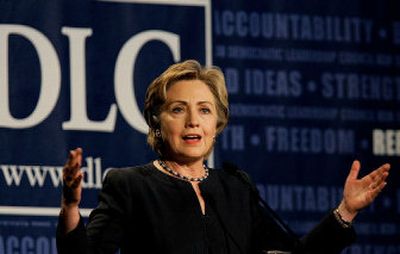Hillary Clinton champions centrist policy for party

DENVER – Centrist Democrats, led by Sen. Hillary Rodham Clinton of New York, on Monday unveiled a policy manifesto to win back the Congress and the White House and distance the party from its clamorous left wing.
The prescription, aimed at middle-class voters and focused on economic issues, capped a three-day meeting here of the Democratic Leadership Council.
Highlights included proposals to make college tuition and home-buying more accessible, expand the availability of health care and provide greater retirement security, all leavened with a smidgen of Bush-bashing.
Clinton wielded a red-white-and-blue bound copy of the group’s initiative and used a measured tone to paint a grim portrait of the past five years under President Bush.
“Americans are earning less while the costs of a middle-class life have soared,” she said. “College costs, up 50 percent in the five years. Health care, 73 percent. Gasoline, more than 100 percent.”
The idea of the policy statement, Colorado House Speaker Andrew Romanoff said at a news conference, is to “give folks something not to shoot at, but to shoot for.”
The DLC, which helped lay the intellectual groundwork for President Clinton’s two terms, has a reputation for being more substantive than slashing. During three days of workshops and panel discussions, there was sober talk of pension portability, regional skill alliances, performance-based governing and the like.
The war in Iraq, the fulcrum for angry splits between liberals and centrists in several races nationwide, was scarcely mentioned.
But politics was never far removed, at both presidential and broader philosophical levels.
Four likely Democratic White House contenders made the trek to the Rocky Mountains to speak and network among roughly 400 elected leaders, mainly from state and local levels.
Clinton, who was charged last year with drafting the agenda unveiled Monday, enjoyed a featured speaking slot along with the group’s chairman, Iowa Gov. Tom Vilsack, and his predecessor, Sen. Evan Bayh of Indiana.
New Mexico Gov. Bill Richardson joined in a panel discussion; former Virginia Gov. Mark Warner telephoned his regrets from a long-planned family vacation in Europe.
Rousing force
The DLC has produced both energy and agitation within the Democratic Party since its creation in the aftermath of Ronald Reagan’s 1984 re-election landslide.
With a stated mission of moving the party toward the center, the organization has been derided as “Democrats for the leisure class” by the Rev. Jesse Jackson and the “Republican wing of the Democratic Party” by former Vermont Gov. Howard Dean, now chairman of the Democratic National Committee. The DLC said Dean was invited to Denver; a party spokeswoman said it was never received, but there were no hard feelings.
Lately, the attacks have come from the left side of the blogosphere, where the DLC has been branded an enemy of true Democrats and its acolytes – chiefly Clinton – excoriated as political sellouts.
Vilsack alluded to those sentiments in his opening speech Monday. He called the DLC “a problem-solving organization, a creative-thinking organization,” not a grass-roots or Net-roots organization, the latter referring to the Web-based political community. While all are elemental to the party’s success, he said, what the DLC produces is “practical Democrats.”
But there were underlying tensions, even among those who traveled to Denver.
At more than one session, participants suggested the party had gone too far in wooing centrist and swing voters.
Rep. Artur Davis, D-Ala., presided over a Sunday workshop on Democrats and cultural issues; he urged his party peers to be more open and less condescending toward people of faith.
“We’ve got to find a way to be more accepting of other people’s point of view,” the congressman said.